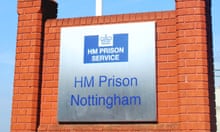Murder behind bars – it’s a story that was already written. In fact I could’ve written most of this article months before Tuesday afternoon, when a 21-year-old father lost his life. All that needed to be filled out were the particulars – the names of the prison, the victims and the assailants. The victim was Jamal Mahmoud, who was, according to his friends, not as bad as his conviction for firearms offences suggests. The location: G wing in HMP Pentonville, known as the Gaza Strip among inmates.
To be honest I wouldn’t have been surprised if this had happened while I was locked up in Pentonville in 2011. I saw some nasty stuff, including an east v south London gang fight between 30 people. Occasionally there was blood, or “claret”, splattered on the wall. A guy had boiling water poured over him. But I’m even less surprised that there is bloodshed now because prison standards have slipped since then. They will slip still further unless drastic efforts are made by politicians to challenge the two-dimensional fallacies spread by those who’ve never experienced life behind the wall. We can’t begin to address the problems in our prisons until we have a realistic sense of what they are like.
There is violence, but it is important to understand that life behind bars is nothing like Hollywood’s bloodbath portrayal. On my release, my mind was damaged, but my body was unscarred, principally because I was not involved in the areas that cause the majority of violent incidents – drugs, gangs and severe mental health issues. From the little we know, at least some of these may have played a part in this week’s killing.
The continuing tragedy is that our prisons need not be like this. Gangs are manageable when you retain experienced staff, but we’ve seen valuable personnel demoralised and replaced by lower-paid equivalents in a short-sighted attempt to save money. The older officers I saw knew who was in which gang, and had a chance of keeping things in check.
But when you have a 21-year-old inexperienced prison officer from the provinces trying to cope with inner-city gang feuds, who can be surprised that things go wrong. The drug problem is also preventable with front-end investment. Think rigorous checks on staff and visitors, sniffer dogs, nets that stop drones and packages full of heroin being thrown over the fence. But in the absence of that, one failure begets others. Failure to tackle drugs leads to exacerbated gang problems. The drugs and gangs are interlinked and both cause violence.
The prevalence of drugs also results in countless people being released with addiction problems that they didn’t have when they entered the system. Each day, on leaving my cell, I saw people sprinkling heroin into roll-up cigarettes.
And then there’s mental health. If we lock up people with a clear need for psychiatric care for 23 hours a day, the result is surely predictable. I would hear people wailing and kicking their doors until 5am. One guy would spend each night screaming “ET take me home”.
So much could change if we were more clear sighted. With a relatively small amount of money well spent, the prison system could exponentially reduce all of the causes of violence.
What’s happening in our prisons is less the biblical battle of good and evil that is commonly portrayed, more a matrix of complexities both good and bad. Liberals argue that prisoners are victims of the system; reflexive rightwingers say criminals are completely capable of making decisions and should therefore suffer harsh consequences. Both are right and wrong.
Both fall victim to the lure of easy answers, when the real solutions – with potential for rehabilitation and the prospect of alternative constructive punishments – require time and concentration.
We need a clear-headed conversation that involves inmates and moves away from the old muddled narratives. We have seen this week what happens in prisons when they are starved of resources and run on the basis of politics and prejudice. No one is reformed, no one is protected, no one wins.









